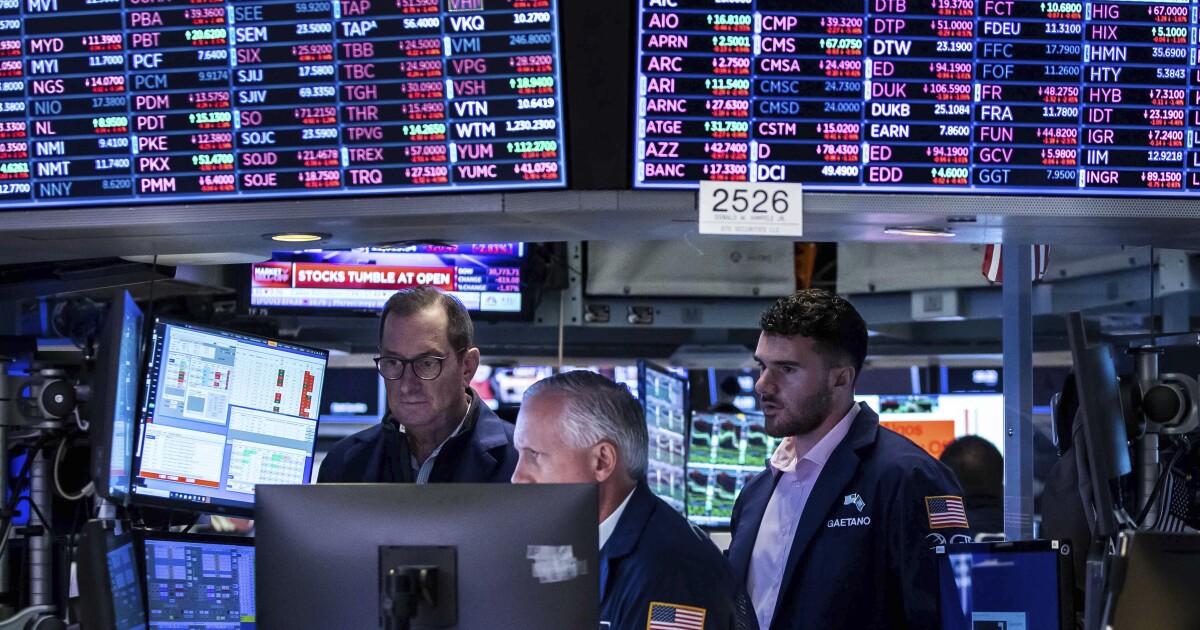

Financial markets took a major hit over the last week in response to red-hot inflation figures and an expected interest rate hike from the U.S. central bank, sparking fears that a recession could be on the horizon.
U.S. stocks entered bear market territory on Monday, June 13, with the S&P 500, a benchmark index for Wall Street, falling 3.9% to reach its lowest level since March 2021. The drop marked a more than 20% decrease from a record-high in January and capped two years of largely consistent growth.
The plunge followed the federal government’s most recent release of monthly inflation data showing that people in the United States continue to pay soaring prices for everyday goods and services despite recent moves from the Federal Reserve to tamp down record-high inflation levels.
Inflation and the market decline represent a delicate challenge for U.S. policymakers as they seek to rein in surging prices for consumers while potentially unleashing an economic collapse that could result in significant job losses.
“The Federal Reserve is in a very precarious position as it needs to walk a very fine line between aggressively fighting inflation but also at the same time not overly tighten monetary policy to the point it could lead to a recession,” Dave Sekera, the chief U.S. market strategist for Morningstar, an investment research firm, told the Washington Examiner by email.
World Bank President David Malpass said recently that “for many countries, recession will be hard to avoid.”
“The war in Ukraine, lockdowns in China, supply-chain disruptions, and the risk of stagflation are hammering growth,” he said in a press release on June 7. “Markets look forward, so it is urgent to encourage production and avoid trade restrictions. Changes in fiscal, monetary, climate and debt policy are needed to counter capital misallocation and inequality.”
On Friday, the Bureau of Labor Statistics announced that the consumer price index, a key marker of inflation, had risen 8.6% over the last year, surpassing financial experts’ expectations. The 12-month jump was the biggest increase since December 1981 and was driven by higher food, fuel, and shelter prices, the bureau said.
The Fed began raising interest rates in March for the first time in years, approving a quarter-point hike in March and a half-point increase in May while signaling that it would likely make similar moves in the summer.
But May’s inflation numbers changed that, and the market on Monday began to anticipate more aggressive action from the Fed. On Wednesday, the central bank did just that, raising interest rates by three-quarters of a percentage point (the largest increase since 1994) while warning of further increases before the end of the year.
“Clearly, today’s 75 basis point increase is an unusually large one, and I do not expect moves of this size to be common,” said Jerome Powell, the chairman of the Federal Reserve, according to a CNBC report.
“We want to see progress. Inflation can’t go down until it flattens out,” Powell said. “If we don’t see progress […] that could cause us to react. Soon enough, we will be seeing some progress.”
Though inflation is affecting many countries, some lawmakers have criticized the Biden administration for addressing inflation concerns too slowly. Treasury Secretary Janet Yellen, who like other top administration officials predicted in 2021 that inflation would be “transitory,” admitted recently that she was “wrong then about the path that inflation would take.”
The White House is “closely watching” the situation, White House press secretary Karine Jean-Pierre said the day after the markets dramatically dipped. “We know that families are concerned about inflation in the stock market,” she told reporters aboard Air Force One. “That’s something that we are aware of. But we know that this is, what we’re seeing right now is, what we’re facing are global challenges: Putin’s price hike, inflation, coming out of a once-in-a-generation global pandemic.”
“The American people are well-positioned, we believe, to face these challenges because of what the president has done this past year and a half on dealing with the economy,” Jean-Pierre said, “a historic economic place that we’re in with more than 8 million jobs since President Biden took office.”
Inflation has surged since Russia invaded Ukraine earlier this year, further disrupting supply chains that have been snarled since the start of the COVID-19 pandemic. As the West banned the importation of Russian energy products in response, fuel prices skyrocketed to historic highs.
On average, bear markets have lasted about 15 months since 1966, according to financial firm Charles Schwab. “And they often end as abruptly as they began, with a quick rebound that is very difficult to predict — a case in point is the S&P 500’s pandemic-fueled bear market in early 2020, which lasted a mere 33 days from the previous high on February 19 to the trough on March 23,” the firm wrote earlier this year. “That’s why long-term investors are usually better off staying the course and not pulling money out of the market.”
Nevertheless, experts expect the next few months to be turbulent for U.S. financial markets. “The markets have had a pretty good run for the past few years,” Reena Aggarwal, the director of the Psaros Center for Financial Markets and Policy at Georgetown University, said in an email. “The combination of high valuations, the Ukraine-Russia conflict, supply chain problems, and certainly inflation have made investors jittery. This market volatility will continue for a while.”
“People are feeling the impact of high prices for basic necessities and are at the same time seeing the value of their retirement plans erode,” she said. “This has to result in consumer spending slowing down and having an impact on economic growth.”
For investors who are close to or in retirement, Schwab says that “[r]egular rebalancing and appropriate diversification are important.” The firm also warns that those approaching or in retirement should avoid tapping their stocks until the market improves.
“When you tap your portfolio as it’s losing value, you have to sell more investments to raise a set amount of cash,” Schwab said. “Not only does that drain your savings more quickly, but it also leaves you with fewer assets that can generate growth and returns during potential future recoveries.”
The firm recommends keeping “a short-term reserve of low-risk liquid investments that you can use to cover your expenses” and postponing big expenses as much as possible.
Sekera, a CFA, also said he expects that “the stock market will continue to be especially volatile over the summer.” He said the market is now grappling with the convergence of four main headwinds — “slowing rate of economic growth,” “tightening monetary policy,” “inflation running hot,” and “rising interest rates,” which Morningstar noted in its 2022 outlook earlier this year.
“In order to stabilize, I expect investors will await signs that inflation will begin to moderate and that the U.S. economy will stabilize without entering a recession,” Sekera said.
Despite the turbulence to come, Sekera and other financial experts say the current market could present an opportunity for savvy investors who take advantage of discounted share prices for strong companies.
“While we were not surprised by the sell-off early in the year, we think the pendulum has swung too far to the downside and that the stock market is now undervalued,” he said.
“Recent market action has the look of some portfolio managers in a position where they have had to sell what they can as opposed to selling what they want to,” he said. “This indiscriminate selling has led to a broad swath of high-quality companies that are now selling at significant margins of safety below our intrinsic valuations.”
“More specifically, some of the best opportunities we see for investors today are among those companies that we assign a Wide Economic Moat — companies that have long-term, durable competitive advantages and typically exhibit the strongest pricing power,” he said.
Sekera said that investors should be “judiciously adding to equity exposure” now and act in accordance with their long-term plan, “which should encapsulate both their investment goals and risk tolerance.”
Some possible areas in which to invest, Sekera said, are in certain communications and technology companies, sectors where he sees “significant undervaluation.” Meanwhile, investors should likely avoid the energy sector, as it has “run up too far this year and it is now overvalued.”
Ryan Payne, the president of Payne Capital Management, shared similar advice with Yahoo! Finance on Wednesday. “I think you buy with impunity here,” Payne said. “As a long-term investor, you buy when there’s blood in the streets. There’s blood in the streets right now, and it’s kind of like revenge of the nerds.”
Payne said that “any of those old-school value names,” Verizon, Citibank, or General Motors, for instance, “right now are great to have in your portfolio.”
“If you look at a portfolio of value stocks, it’s down less than 10% this year,” Payne said. “The only bear market you’re seeing right now is in growth, disruptive technology, and bitcoin. But the reality of it is if you take tech out of the S&P 500, you’re trading at 14 times forward earnings. That’s so cheap. That’s been as cheap as it’s been in years. I think you have a gift from the gods here as a long-term investor to buy.”






